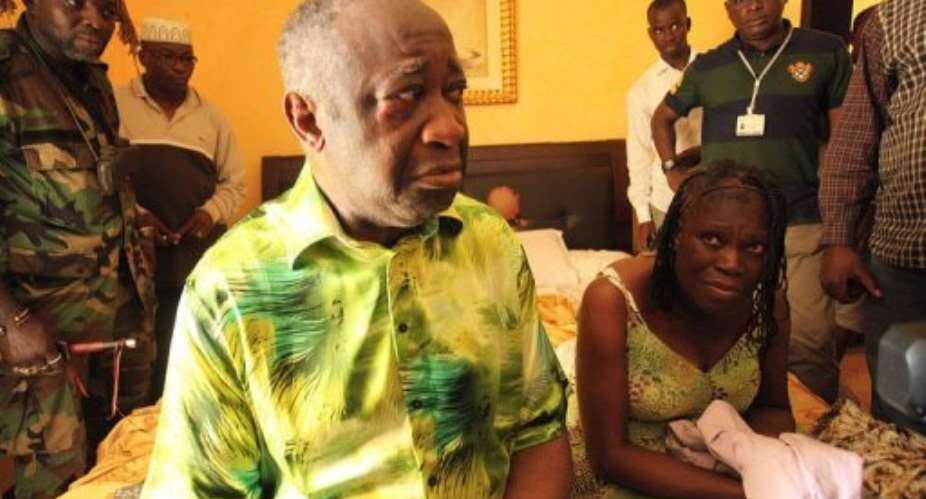THE HAGUE (AFP) - Ivory Coast's ex-president Laurent Gbagbo was remanded to the custody of the International Criminal Court on Wednesday to face charges over post election violence that killed some 3,000 people.
"He is here," a source close to the investigation, who asked to remain anonymous, told AFP shortly after the former west African president arrived at the ICC's detention unit in a seaside suburb of The Hague.
The 66-year-old is the first former head of state to be surrendered to The Hague-based body. He found out he would be transferred to the court only on Tuesday as he was served an ICC arrest warrant, one of the lawyers in Ivory Coast, Jean Gbougnon, told AFP.
A plane carrying the former president landed at Rotterdam airport a little before 4:00 am (0300 GMT), the ANP news agency reported. From there, he was taken to the detention facility, about 20 kilometres (12 miles) away.
Ivory Coast's new rulers had been pressing for weeks to have Gbagbo transferred to The Hague and the move comes less than two weeks before the December 11 legislative elections in the former French colony.
ICC spokesman Fadi el-Abdallah told AFP on Tuesday that the court could not comment on the Gbagbo's case until the judges make their decision public.
Gbagbo was flown out of the country in a plane chartered by the Ivorian authorities.
For months, since his arrest in Abidjan on April 11, he had been held in Korhogo, in the north of the country, as Ivorian investigators built a case against him.
At home, Gbagbo faced charges for "economic crimes" allegedly committed during the political crisis and conflict triggered by his refusal to hand over power, which sparked the deadly post-election conflict.
But the ICC had launched its own investigation.
Last month, its judges allowed prosecutor Luis Moreno-Ocampo to probe alleged post-election war crimes and crimes against humanity committed by both forces loyal to Gbagbo and alse to those loyal to new Ivorian President Alassane Ouattara.
Human Rights Watch, while welcoming news of Gbagbo's transfer to the ICC, made it clear that the forces loyal to Ouattara also had to answer for alleged atrocities committed during the conflict.
"The ICC is playing its part to show that even those at the highest levels of power cannot escape justice when implicated in grave crimes," said Elise Keppler, HRW's senior international justice counsel in a statement.
But the ICC should also make sure it investigated both sides as "the many victims of abuse meted out by the forces loyal to President Ouattara also deserve to see justice done."
In Ivory Coast the leaders of three small pro-Gbagbo parties announced they were pulling out of the December vote in protest at the transfer, which they argued would hamper national reconciliation.
In Paris, Lucie Bourthoumieux, another lawyer for Gbagbo said: "This decision by the International Criminal Court is illegal and goes against the interests of the country and of national reconciliation."
And a former Gbagbo aide, Bernard Oudin, also denounced the move as politically motivated in comments to French television.
But the United States said Tuesday the ex-leader had to face the consequences of his refusal to concede defeat in the 2010 presidential election.
"He now needs to be held accountable for any human rights abuses that he may have carried out," State Department deputy spokesman Mark Toner told reporters in Washington.
The Ivory Coast is the seventh African country for which a probe has been launched by the International Criminal Court (ICC) since it was set up in 2002.
Others have targetted Kenya, Libya, Sudan, the Democratic Republic of Congo, the Central African Republic and Uganda.





 NDC demands complete overhaul of security protocols at EC to safeguard electoral...
NDC demands complete overhaul of security protocols at EC to safeguard electoral...
 Ghana reaches interim deal with international bondholders — Finance Ministry
Ghana reaches interim deal with international bondholders — Finance Ministry
 Mahama to form joint army-police anti-robbery squads to safeguard 24-hour econom...
Mahama to form joint army-police anti-robbery squads to safeguard 24-hour econom...
 Another man jailed eight months over shrinking penis
Another man jailed eight months over shrinking penis
 Ghana to adjust external bond deal to meet IMF debt sustainability goals — Finan...
Ghana to adjust external bond deal to meet IMF debt sustainability goals — Finan...
 IMF negotiations: We've not failed to reach an agreement with bondholders; we’ve...
IMF negotiations: We've not failed to reach an agreement with bondholders; we’ve...
 EC begins recruitment of temporary electoral officials, closes on April 29
EC begins recruitment of temporary electoral officials, closes on April 29
 NPP lost the 2024 elections in 2022 due to inflation and cedi depreciation — Mar...
NPP lost the 2024 elections in 2022 due to inflation and cedi depreciation — Mar...
 Your good heart towards Ghana has changed; don’t behave like Saul - Owusu Bempah...
Your good heart towards Ghana has changed; don’t behave like Saul - Owusu Bempah...
 Wa West: NDC organizes symposium for Vieri Ward Women
Wa West: NDC organizes symposium for Vieri Ward Women
